To all Shades and Earth lovers...
Are you a shades- or fashion lover with an even bigger love for our planet? That means you're probably ready to take the next step. Sustainable, eco-friendly fashion has become a big thing in the last couple of years. Including sustainable eyewear. And luckily the peak is not nearly in sight.
Which is a true blessing because the need to improve our consumer ways continues to grow as well. To put it differently: the need has always been there and growing. But what has finally changed is our mindset and the fact that we have become more conscious about our impact. The global market is dominated by a few corporate giants that continue to use primarily plastic and fossil-fuel based acetate. But this article focuses on some sustainable pioneers leading the eco-friendly way!
'The One' true sustainable solution?
So, it there such a thing as "The One, true sustainable solution? Many brands and companies claim that they have the ultimate sustainable shades solution. They often focus on one specific thing and do that really well. For instance, they use recycled material. Or they focus on working with local materials, to limit transport and thus CO2 emissions. All really good initiatives in themselves.
But now that different companies have found different ways to be more sustainable, it becomes interesting to see in what ways your sunnies can be sustainable. From sustainable new materials invented, to existing but recycled. And from conscious ways of production to transporting and packaging them.
Now that different companies have found different ways to be more sustainable, it becomes interesting to see in what ways your sunglasses can be sustainable. From sustainable new materials, to existing but recycled. And from conscious ways of production to transporting and packaging them.
Sustainable, eco-friendly alternatives
Sunglasses can be made from different materials. And one type of material is more sustainable than another. Many people associate sunglasses with the injection plastic models that you see everyhere since the 80s. These are cheap to make and difficult to break, which makes them perfect for cost-focused manufacturers. But not at all sustainable. These are the traditional products with their roots in a bygone time. A time when we believed our Earth could be harvested without consequences. You will not find them in this list. But what you will find here might surprise you.
Here are the Top 10 ways how your sunglasses can be sustainable. With a top 10 of eco-friendly shades brands leading the way.
We distinguish 10 different solutions in these three categories:
The Top 10 ways how your shades can be sustainable:
100% natural materials
Wood and Bamboo sunglasses
A perfect sustainable alternative for plastic is wood. And preferably wood from controlled and managed forests. Another, even better, alternative is sustainable bamboo. Bamboo can grow up to almost 1 meter per day and therefore there is no shortage of this material. And after cutting bamboo, it even grows back on!
Below are four examples of wood and bamboo sunglasses
BEINGBAR Sun Eyewear
From: Amsterdam, NL
Eco-friendly because: hand made sunglasses from fast growing, sustainable bamboo. And packaged and shipped 100% plastic-free. BEINGBAR gear is made with core principles as starting point. When you choose these shades, you promote a plastic-free industy.
Website:

Obviously we mention our very own BEINGBAR Eyewear. We craft what we call "The ultimate sustainable and conscious eyewear". Every product is hand made and looks different and unique. Products are made in small runs, which makes the products personal. The BEINGBAR Sun Eyewear brand is built on foundational core principles. Examples of this are that you (the wearer) and the environment come first. With every purchase you support a non-profit organization that promotes the plastic-free industry.
If you're interested in BEINGBAR sustainable sunglasses visit the main website here.
Grown Eyewear Sunglasses
From: Australia
Eco-friendly because: Made from sustainable, renewable materials and supporting the WIRES organization, who provide 'The Gift of Life' to 1 orphaned or injured Australian animal. Especially topical with the terrible Australian bushfires at the start of this year.
Website: https://growneyewear.com.au/

Another cool bamboo and wood-based sunglasses company is Grown Eyewear. Their products are made from organic and renewable materials. And they're free from toxic elements. Each pair looks different because of the material choice, with its one-of-a-kind grain pattern. The products have a very natural design. Inspired by a desire to make a meaningful impact on the planet. Grown eyewear supports WIRES, an Australian wildlife rescue organization.
Sticks & Sparrow Eyewear
Part of: Eyetribe
From: Australia
Eco-friendly because: Made from sustainable reclaimed wood and cork. They minimze waste during production. And Sticks & Sparrow provide new applications for nature`s underutilised renewable resources.
Website: https://www.sticksandsparrow.com.au/
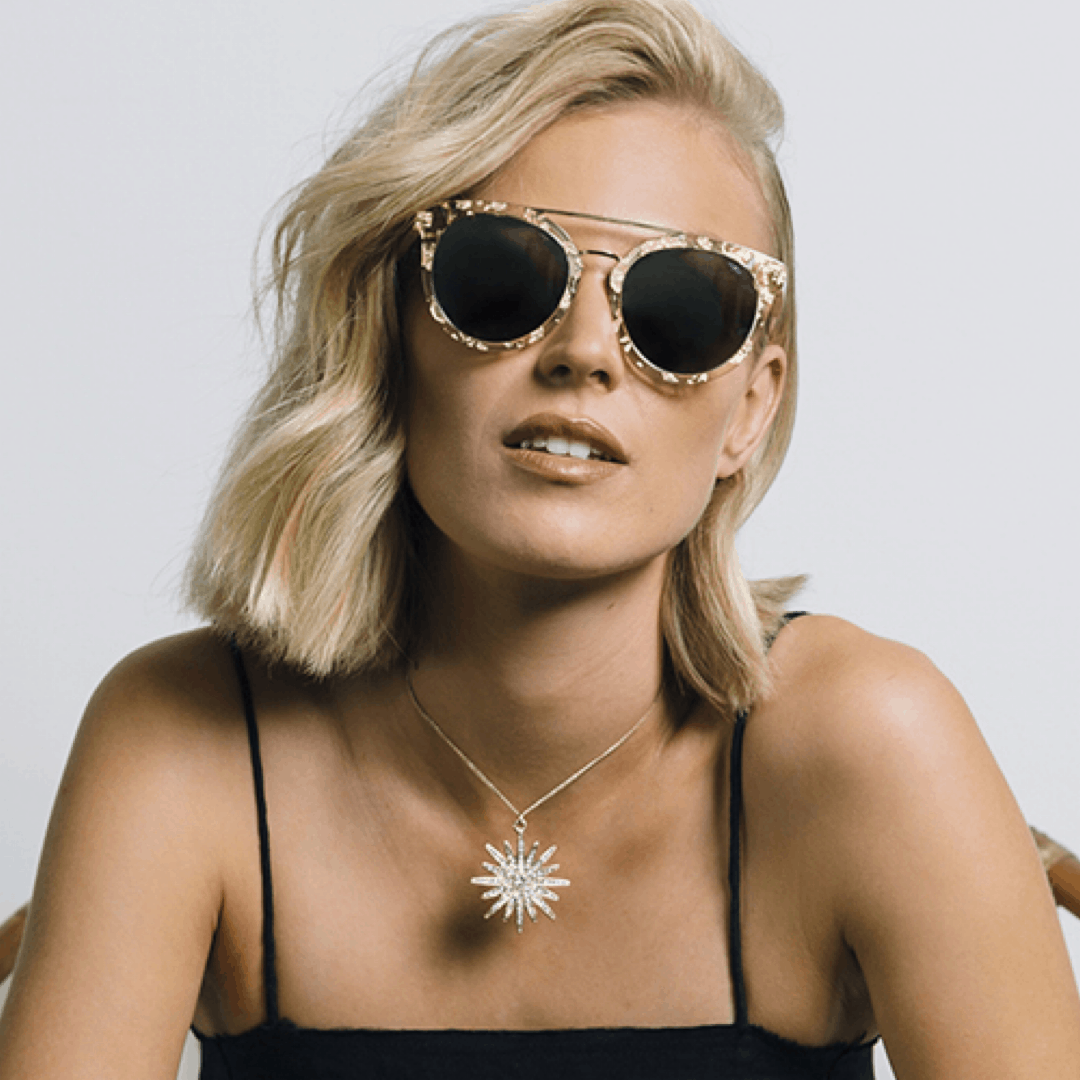
Nice looking sunglasses models made from reclaimed wood and cork. Sticks & Sparrow started in 2011 as a subdivision of Eyetribe, from Australia. They company prides itself by utilizing sustainable materials, minimize wastage and provide new applications for nature's underutilised renewable resources. Sticks & Sparrow eyewear has a strong connection to nature with a distinctly Australian tone.
Swell Vision Eyewear
From: North Carolina (NC), USA
Eco-friendly because: They "promote sustainability across our globe". However, from their website it's not 100% clear why they are sustainable, other than that they use bamboo for their products.
Website: https://www.swellvision.com/
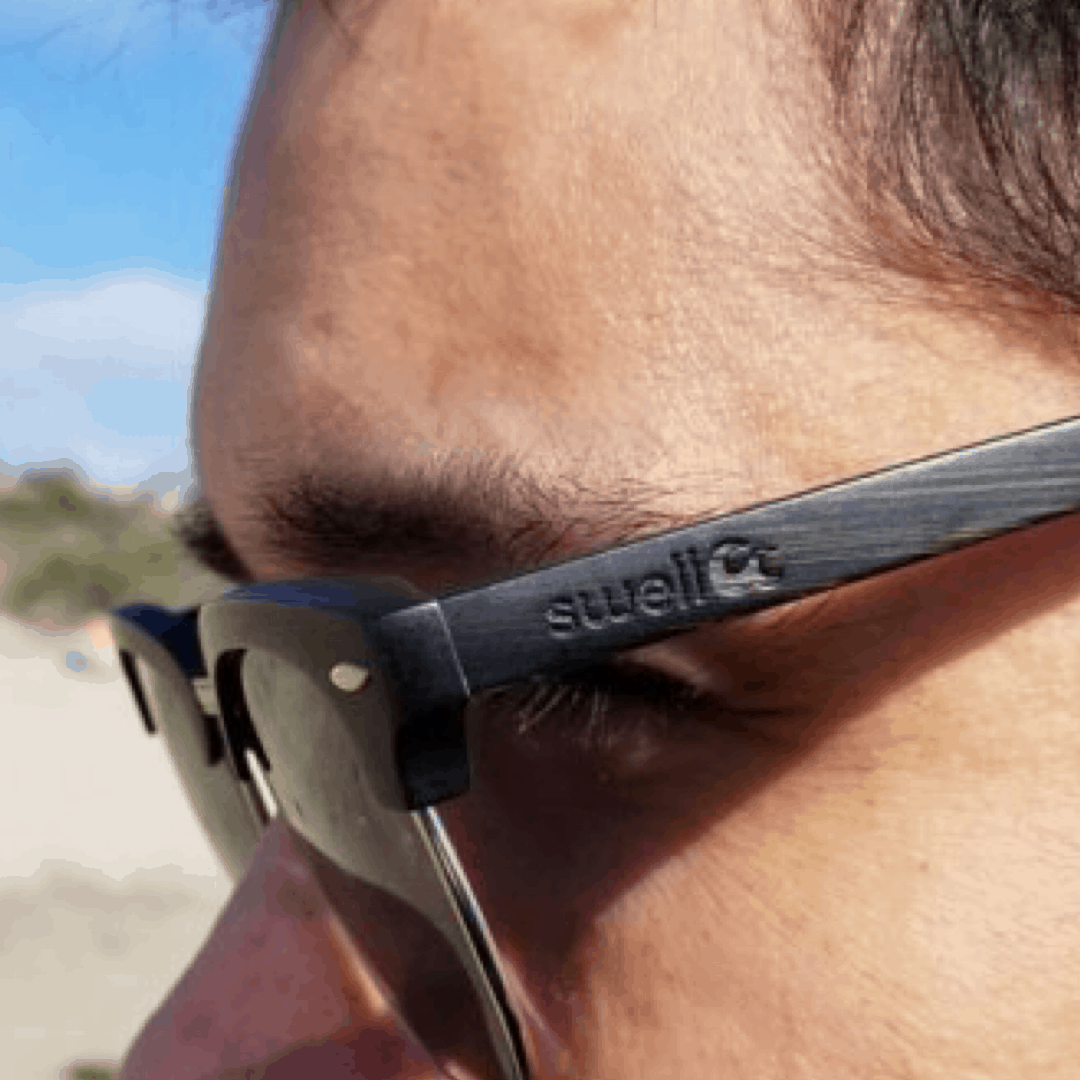
"Handcrafted, eco-friendly products that you can feel good about wearing, knowing that you are a part of a greener future for our planet". Swell Vision also reinvest some of their profits into education via the Green School in Bali – an international, non-profit school.
Recycled materials
Some materials can be reused or repurposed and are perfect for eyewear and sunglasses. Even if these are not the first material you would associate with shades. For instance, there are brands that use old fishing nets that went rogue in the ocean (a better explanation is that they often get ditched in the ocean when they are close to replacement).
Repurposed materials, like skateboard decks and vinyl records
Other examples of repurposed materials are wood from old surf boards, repurposed skateboard decks or even old vinyl records, changed into really cool shades. Really nice and creative reuse!
Below are three examples of sunglasses made from recycled materials.
Solo Eyewear
From: California, USA
Eco-friendly because: The Solo motto is "Eco Friendly Sunglasses that Make a Difference". Their products are made from recycled plastic and repurposed bamboo.
Website: https://www.soloeyewear.com/
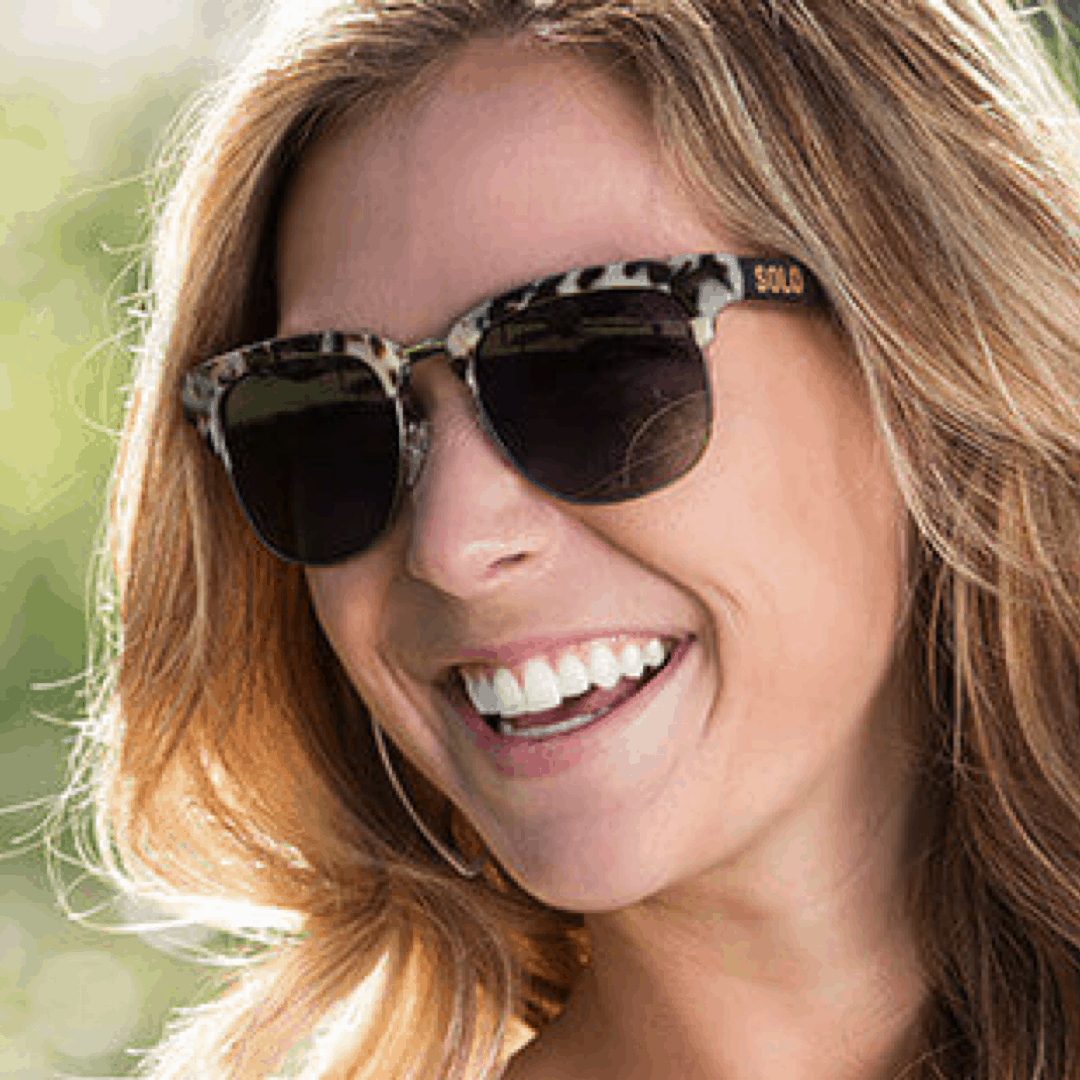
Solo Eyewear makes 'Great Sunglasses for a Greater Cause'. The SOLO Eyewear line consists of eco-friendly sunglasses in which every pair purchased helps to fund eye care for people in need. Since the company was founded in 2011, SOLO has restored vision to nearly 10,000 people in need across thirty-two countries. SOLO sunglasses are all made with repurposed bamboo frames. note that they also have a range of handcrafted acetate frames.
Woodzee Eyewear
From: California, USA
Eco-friendly because: The Woodzee products are made from wood. And Woodzee Eyewear have a recycling program where you can exchange an old Woodzee product for a 50% discount on a new one, through a form on their website.
Website:

Woodzee Eyewear is made from wood. And they even have a range of sunglasses made from repurposed sketeboard decks. They have a recycling program where you can exchange an old Woodzee product for a 50% discount on a new one. It's not immediately clear what they do with the frames that are handed in, but one can assume they reuse the materials. Just like they do with the skateboards that are repurposed.
Vinylize Eyewear
From: Budapest, Hungary
Eco-friendly because: The Woodzee products are made from wood. And Woodzee Eyewear have a recycling program where you can exchange an old Woodzee product for a 50% discount on a new one, through a form on their website
Website:
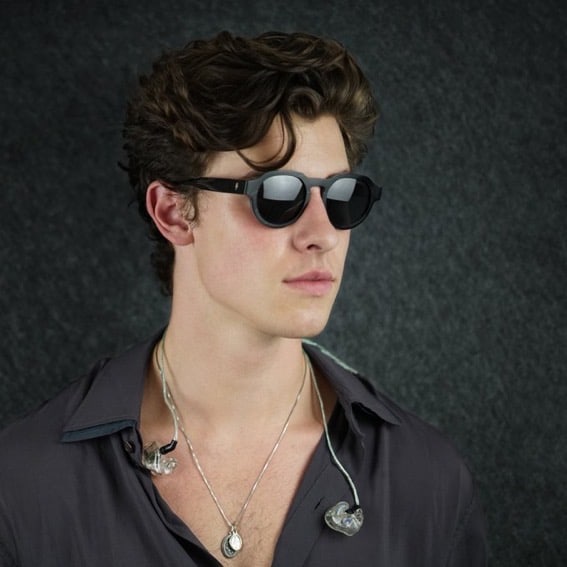
A really cool origin story, from Europe. Hungarian-American Zachary Tipton’s vision was getting worse and he needed spectacles. One day, looking around his garage workshop, he spotted his father’s collection of old vinyl records. He realized eyeglass frames could be made from vinyl. Vinylize as an eyewear concept was born. They later introduced suglasses in their assortment.
The company does not market themselves specificially as sustainable. However, finding a new purpose for old unused products allows them a spot in this Top 10. You could argue that Vinylize should be mentioned in the third category (Eco-based materials). Why? Because the old vinyl is first transformed into cellulose acetate. As you will read later in this article, this is an eco-based material.
Eco-based materials
Yes, this looks like the first point, but it's not. These are materials that are natural-based but not 100% natural. These materials are considered sustainable, but with a side remark. The best example here is acetate. It has the looks of high quality plastics. And it's often used in classic-type models because of it's quality, vintage look. Not injected, not molded, but taken out of one sheet of this material. So, why do I mention this material in this article?
Acetate, or to be more complete "cellulose acetate", is made from a cellulose-based resin. The cellulose is mostly made from wood pulp, as a by-product from wood production. Or from cotton production residu. sounds natural and really good, right?
100% natural materials or not?
Now, there are two reasons why some people are critical about calling acetate "sustainable". The first is that often a chemical component is added to harden and/or color the material. The second problem is that in the original production of the cotton-based cellulose is not very sustainable. They often use enormous amounts of not-so-sustainable pesticides.
Below are three examples of sunglasses made from natural-based (bio-based) materials
Acetate vs Eco-Acetate and Ecotate™
There is a variant that is unofficially called eco-acetate, or our very own Ecotate™. So in case you're interested in this style, make sure you ask for clarity about where the material is coming from.
Here are three examples of sustainable companies, with eco-based sunglasses:
MODO - Eco Eyewear
From: NY, USA
Eco-friendly because: They have the One frame, One tree program. This means they plant a tree for every frame sold. They partner with NGO Trees for the Future. Their range is made from 95% bio-based materials.
Website:

Eco-eyewear is a range of MODO, USA. The company was founded 30 years ago. In 2009 they intruduced their sustainable range of products. Eco is about expressing yourself and feeling good in your own skin. But more importantly, they make beautiful sustainable eyewear. Both sunglasses and optical. Their biobased frames are partly made from a material made from castor seeds. Note that they also have a partially recycled range, that is made from 95% recycled material.
Proof Eyewear
From: Idaho, USA
Eco-friendly because: Proof provides products made from sustainable materials including sustainably-sourced wood, cotton-based acetate, recycled aluminum, and repurposed skateboard decks. They partner with Nature Conservancy in Idaho.
Website:

Proof makes different types of sustainable eyewear. They make products from sustainably-sourced wood, cotton-based acetate, recycled aluminum, and repurposed skateboard decks. So just like with Eco-Eyewear and Solo, they desrve to be in at least one other category in this article. Proof stands firm on three principles: heritage, sustainability, and giving back. They partner with Nature Conservancy in Idaho.
Freshforpandas
From: London/Manchester, UK
Eco-friendly because: Besides having wooden and bamboo models (the 'Panda' bit gives it away) they have a range of plant based acestate products. Frashforpandas ship carbon-neutral from their manufacturing facility in Manchester.
Website:
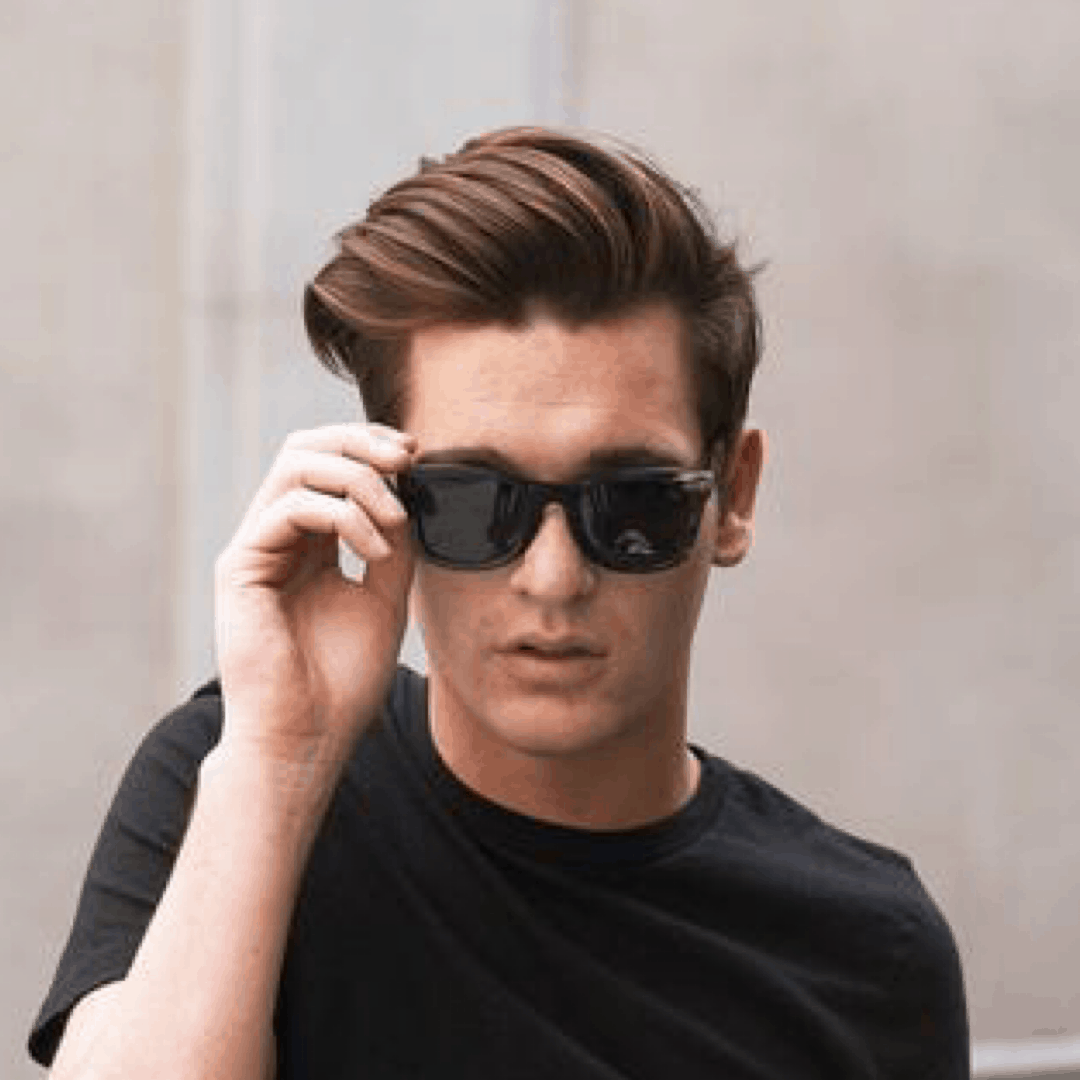
A London based online store selling eco-friendly sunglasses and spectacles. They make frames from biodegradable plant-based acetate and bamboo. However, they also have another range that stands out and might not fit the "sustainable" label directly. They make frames from what they call "Ethically sourced Indian buffalo horn". This is a material that resembles acetate in look and feel. Unique? Yes! Sustainable and ethical? Maybe! They do however, ship their products carbon-neutral from their manufacturing facility in Manchester.
So, this concludes this article about the Top 10 ways how your sunglasses can be sustainable. Are you interested in reading more about high quality sunglasses? And more specifically in shades that take a different approach. BEINGBAR shades are the ultimate conscious and sustainable sunglasses, made with natural materials. For people who make their own conscious choices. Click here to read more. Or visit BEINGBAR.com


